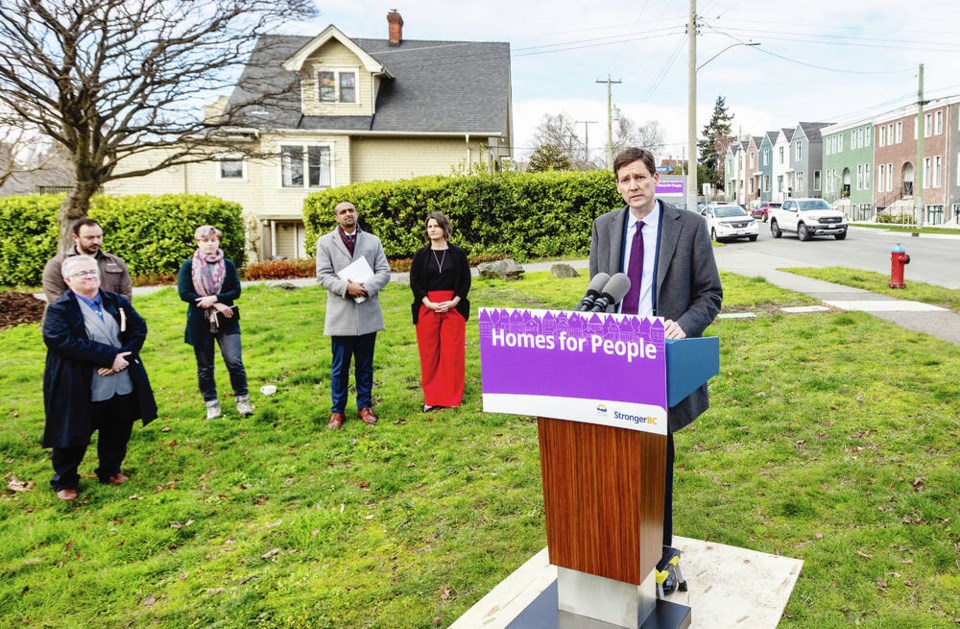They will still be around for a few decades. There will be a steadily shrinking high-income market for them for years to come. But the owner-occupied, stand-alone single-family-home model that took off after the Second World War and defined our way of life for three generations is steadily being dismantled.
A never-ending price spiral fuelled by cheap money started eroding the concept years ago. Shrinking supply brought on partly by local government zoning attempts to preserve the model wound up doing more damage.
After a decade of hand-wringing about housing prices, the national average price rose 34 per cent over a 21-month period during the pandemic. More than 100,000 people moved to B.C. in 2021.
Recent dramatic policy changes in the cities worst hit by the housing crisis fractured the concept further.
The latest damper on that fading dream was announced Monday.
It came with the release of a “refreshed” provincial housing policy that is designed to attack the housing crisis by freeing up far more room for far more smaller living spaces in the burbs.
It pushes some themes in the NDP’s first major housing policy further and puts far more emphasis on middle-income, small-scale, multi-unit housing. There are still more promises to encourage faster construction and cheaper development costs.
It will take a year or more for the new version of the policy to take hold, but when it does, the changes will become obvious in every neighbourhood.
Legislation is coming this fall that will apply to many places in B.C. and will allow up to four units on a traditional-sized single-family detached lot.
The phrase “local zoning be damned” isn’t included in the policy. But it is implicit. The province plans to work “with” municipalities and partners on the zoning change.
But the NDP has already started to give itself the power to override them if necessary.
“Taking this step to move away from exclusively single-detached zoned neighbourhoods enables the development of more homes in existing neighbourhoods.”
Also coming this fall through legislation is blanket approval for secondary suites anywhere in B.C., regardless of local restrictions. It comes with a financial incentive to encourage homeowners to start building them — a forgivable loan of up to half the renovation costs, to a maximum of $40,000.
Owners have to hold the rent to below-market levels for five years to qualify.
The Housing Ministry is counting on producing 3,000 suites in three years.
There is also a new flipping tax coming that will penalize speculators who buy properties and resell them soon after to capitalize on the price spiral. It will be “based on how soon they happen after the initial purchase.”
As well, the speculation and vacancy tax, which was expanded to six more municipalities in 2022, could be widened further.
The never-ending complaints about red tape and long delays in approving housing starts will also get some attention.
A new online portal is promised to speed the process up. Digitized construction codes and design and permit processes are coming.
The one curiosity in the unveiling of Housing Push 2.0 is the contrast between the relatively slow pace of the latest efforts to be announced and the urgency of the acknowledged “foundational” crisis.
Legislation to quadruple housing on single-family lots won’t arrive for nine months, and take months more to take full effect. Same goes for the province-wide secondary suite approval.
No timeline was given for the flipping tax, but it’s not likely until fall either.
The incentive to build secondary suites won’t be available until early 2024.
Premier David Eby said: “I don’t think you should read the plan as starting nine months from now because it started the day we formed government and that’s work that’s going to continue.”
Much of the update dwells on the billions spent in the last five years as the NDP bulked up housing programs. But the progress report on what the money produced is a source of constant argument.
The government counts thousands of units “in progress” and “under active construction” while claiming it has started 75,000 homes en route to the goal of 114,000 over a decade.
Opposition B.C. Liberals say it’s more like 16,000.
Regardless, thousands more residences are needed. There’s not much room left to build them, so most will be shoe-horned into those huge tracts of single-family zoned land.
>>> To comment on this article, write a letter to the editor: [email protected]


